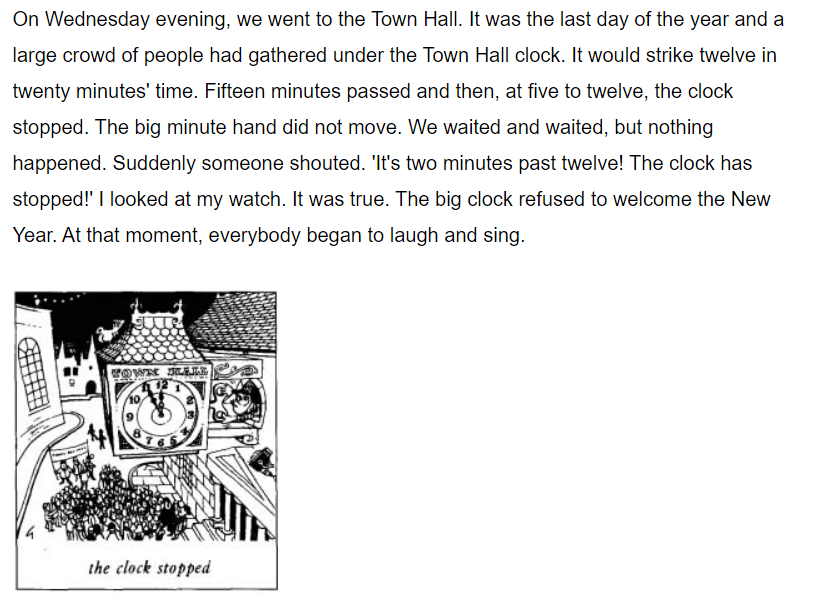1.原文

2. 参考译文

3. New words and expressions
★welcome n. 欢迎;v. 欢迎
- ① n. 欢迎 a cold welcome 冷遇
- ② v. 欢迎 welcome to+地点
welcome to China;;welcome home;welcome back - ③ adj. 受欢迎的You are welcome.
You are welcome to+地点
★crowd n. 人群
- ① n. 人群 in the crowd 在人群中
I spotted him in the crowd. 我在人群中一眼就认出了他
a crowd of people 一群人,没有次序的人群, 拥挤的人群a group of people 一群人,有次序的人群 - ② v.拥挤, 挤满
a large crowd of people 一大群人
crowds of people 许多人, 人山人海
★gather v. 聚集
- ① vt. 使集拢,集合,召集
He gathered a large crowd of people round him. - ② vt 收集,采集,收(庄稼等)
The children are out in the field gathering flowers. 孩子们在外面地里采花。
It has taken me a lifetime to gather all these books. - ③ vi. 集拢,聚集,集合
They gathered under the Town Hall clock.
people gathered 人们聚集在一起, 尤指自发性的
★hand n. (表或机器的)指针;手
- minute hand;second hand;hour hand
second hand 二手的,旧的,秒针
wait me a moment/wait me a few seconds(for a few secs.) (secs.是seconds的缩写)
★refuse v. 拒绝
- ① vt. 拒绝(接受、服从等)She refused the gift.
- ② vt. 拒不,不肯,不愿
John refused to change his mind. 约翰拒不改变主意。③ vi. 拒绝,不接受
I offered to pay him for his help, but he refused.。
★shout v. 喊叫 scream 尖叫
- call out 大声喊叫cry out 大声哭喊
4. 课文讲解
- 1、A cold welcome 冷遇
cold adj. 冷的, 寒冷的, 冷淡的
cold fish 冷漠的人My brother is a cold fish.
lucky dog 幸运的人 - 2、On Wednesday evening, we went to the Town Hall.
morning,afternoon,evening前如果加修饰词则用介词on,否则用in .Town Hall 市政厅 - 3、It would strike twelve in twenty minutes’ time.
★strike v. 打,击;敲,弹(钟,乐器等)
① v. 打,击She struck the man in the face.
② v. 敲,弹(钟,乐器等)
strike the clock(人)敲钟clock strike 钟自己响
Listen, the clock is striking.
strike twelve 数字表示敲击的次数
minutes’名词所有格,用来表达时间
名词所有格表示时间或距离
It will leave in five minutes’time.
in twenty(minutes’time)名词所有格可省略
How far is the school from here?
3 minutes’ walk. 三分钟路程。 - 4、We waited and waited, but nothing happened.
waited and waited 等啊等啊, 强调动作的重复(walked and walked;run and run)
happen vi.事情做主语, 事情发生
What happened? Nothing happened. - 5、It was true that+从句 ……是一个事实
- 6、The big clock refused to welcome the New Year.
refuse to do sth. 拒绝去做某事 - 7、At that moment, everybody began to laugh and sing. at that moment = just then 就在那时
at the moment = now 现在, 此刻, 在此时
5. Key structures
引导时间状语的介词in/on/at/during/till与until
- 1、用in的时间短语有:
① 表示一天中的某段时间:in the morning;in the afternoon;in the evening
② 表示周、月份、年份:in a week;in January;③ 表示季节:in summer;in spring;in autumn; in+表示时间长度的短语可以表示“在某段时间之内”,这时可以与现在时、过去时或将来时连用,一般与完成某动作有关;还可译为“……时间之后”,一般与将来时连用。根据时态判别in 表示的含义
in twenty minutes’ time 20分钟之后
We will finish class in half an hour. - 2、用on的时间短语有:
① 表示星期:on Monday;on Friday
② 表示日期:on June 1st;on 23rd March(在书写日期时没有冠词,但在口语中则分别读为:on June the first;on the 23rd of March)
③ 表示星期+日期:on Monday, June 1st
④ 表示具体时间:on Wednesday evening on that day - 3、用at的时间短语有:
① 表示确切的时间:at five to twelve;at ten o’clock
② 表示用餐时间:at lunch/dinner time;at teatime
③ 表示其他时刻: at noon;at midnight;at that time - 4、during在……期间,后必须跟一个名词,可以指整个一段时间,有时可以用in替代
He has phoned four times during the last half hour.
I met him sometime during the week.(不能用in代替) 我是在这一周的某天遇到他的。
during the holiday 强调假期的从头到尾
He enjoyed himself during his holiday.
in the holiday 强调这段时间其中某一点时间, 并不表示自始至终
I was caught in an accident in the holiday. - 5、from…till… 指一段明确的时间:
The tourist season runs from June till October. - 6、until prep.&coin. 直到……时候,直到什么时候为止, 直到什么时候才
until主句和从句两个都用一般过去时对(最习惯的一种用法), 主从句任何一个用过去完成是也对
I can’t enter for the sports meeting until tomorrow.
We hadn’t disturbed him until he finished work.
We didn’t disturb him until he had finished work.
We didn’t disturb him until he finished work.(更习惯于这种用法) - 7、时间表示方法 : What’s the time?/What time is it?
A整点 : A o’clock A点B分(B<30): A B / B past A
A点15分 : A fifteen / fifteen past A / a quarter past A
A点30分 : A thirty / half past A
A点B分(B>30) : A B / (60-B) to (A+1)
A点45分 : A forty-five / a quarter to (A+1) / fifteen to (A+1)
6. Special Difficulties
Any,Not…Any and No
any 用于否定句和疑问句中, some用于肯定句(或要求得到肯定回答的疑问句)
Do you have any friends?/I don’t have any friends.
not 用在非实义动词后面, 实义动词前面.
not any=no <adj.>用在名词前面,no比not any的语气要强,但这两种否定的意义是相同的。
I have no friends.
no可构成复合词nobody,none,nothing,nowhere;any可构成复合词anybody,anything和anywhere。
一句通常只能有一个否定词(包括never,hardly等)






















 1019
1019











 被折叠的 条评论
为什么被折叠?
被折叠的 条评论
为什么被折叠?








